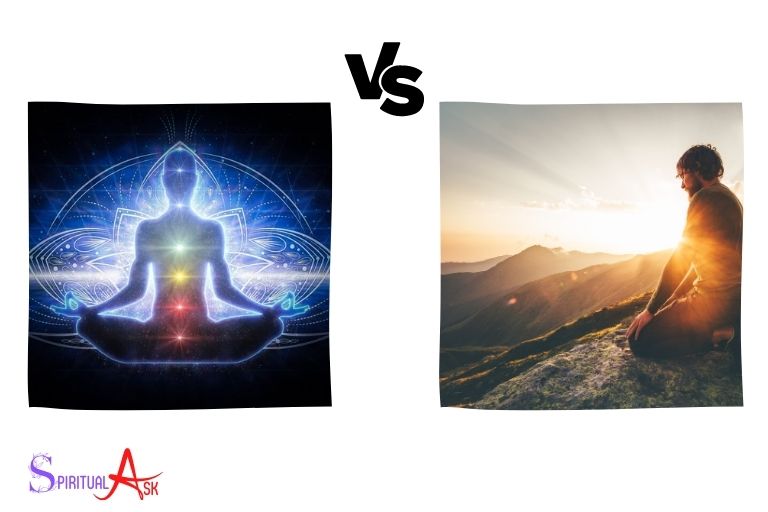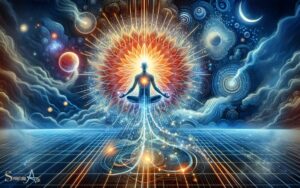Kundalini Awakening Vs Spiritual Awakening: Different!
Kundalini Awakening and Spiritual Awakening, while related, are different experiences. Kundalini Awakening is a physical and energetic process involving the rise of the ‘Kundalini energy’ from the base of the spine to the crown of the head, usually resulting in profound physiological and psychological changes.
In contrast, Spiritual Awakening is a broader, more holistic experience, involving a profound shift in consciousness and identity, often leading to significant changes in lifestyle and world view.
Kundalini Awakening refers to a powerful energetic phenomenon rooted in Hindu spiritual traditions.
The kundalini energy, symbolized as a coiled serpent at the base of the spine, awakens and ascends through the seven chakras, resulting in a variety of physical, emotional, and mystical experiences.
Spiritual Awakening, on the other hand, is not tied to a specific tradition or energy system. It is a universal experience of ‘waking up’ to a larger spiritual reality beyond the personal self and material world.
It often involves heightened awareness, inner peace, compassion, and a sense of interconnectedness with all life.
While Kundalini Awakening and Spiritual Awakening are different, they are not mutually
6 Aspects: Kundalini Awakening and Spiritual Awakening
| Aspect | Kundalini Awakening | Spiritual Awakening |
|---|---|---|
| Definition | Kundalini awakening is a form of divine energy through the chakra system. | Spiritual awakening is the realization of one’s connection to the universe and consciousness. |
| Experience | It is often intense and can feel like a surge of energy moving upwards from the base of the spine. | An individual awakening spiritually might feel a sense of peace, interconnectedness, and a deeper understanding of themselves and others. |
| Symptoms | Symptoms include heat sensations, involuntary jerks, hallucinations, emotional upheaval etc. | Signs include feeling peace and unity with the universe, experiencing empathy for others, questioning old beliefs etc. |
| Practices Involved | Primarily involves yoga, meditation and breathing techniques. | Varies greatly, but can include meditation, prayer, letting go of old habits, or practicing mindfulness. |
| Duration | Can be sudden or take many years, and is often cyclical or fluctuating in nature. | Can also be sudden or gradual, and is usually a lifelong journey rather than a single event. |
| Goal | Often the goal is to raise the Kundalini from the base of the spine to the crown of the head, signifying spiritual enlightenment. | The goal of spiritual awakening is typically a deeper connection with the divine, inner peace, and an understanding of one’s purpose in the world. |
Key Takeaway

Five Facts About: Kundalini Awakening And Spiritual Awakening
What Is Kundalini Awakening?
Kundalini Awakening Vs Spiritual Awakening: What Is Kundalini Awakening?
Kundalini awakening is a term used in hinduism and yoga and refers to the spiritual energy that is believed to be located at the base of the spine.
When activated, this energy is said to rise up through the chakras, resulting in an expansion of consciousness and spiritual enlightenment.
Here are some key points to help you understand kundalini awakening.
The Concept Of Kundalini In Hinduism And Yoga
- Kundalini is a sanskrit word that means “coiled up.”
- Kundalini energy is believed to reside at the base of the spine, coiled up like a serpent.
- According to hinduism and yoga, activating this energy can lead to spiritual enlightenment.
The Process Of Awakening Kundalini Energy
- Awakening kundalini energy can happen spontaneously or through specific practices like yoga or meditation.
- The process involves opening the chakras and allowing the energy to rise up through the body.
- The process can be intense and is not recommended for individuals with certain mental or physical health conditions.
Signs And Symptoms Of Kundalini Awakening
The experience of kundalini awakening can differ for each individual, but some common signs and symptoms include:
- Intense physical sensations such as heat or coldness
- Emotional upheaval
- Changes in perception of reality
- Heightened psychic abilities
- These symptoms can be temporary or long-lasting.
Benefits And Challenges Of Kundalini Awakening
Advantages of kundalini awakening include:
- Increased spiritual awareness and enlightenment
- Enhanced creativity and intuition
- Improved physical health
Challenges of kundalini awakening may include:
- Intense physical, emotional, or mental experiences
- Difficulty integrating the experience into daily life
- The potential for negative effects if the individual is not ready for the experience.
Kundalini awakening is a powerful and transformative experience that can bring about spiritual enlightenment and a deeper understanding of the self and the universe.
Like any powerful experience, it is essential to approach it mindfully and with careful consideration.
What Is Spiritual Awakening?
Kundalini Awakening Vs Spiritual Awakening: What Is Spiritual Awakening?
Spiritual awakening is a profound realization that goes beyond religious belief, cultural background, or personal preferences.
It is a state of heightened awareness and consciousness where the individual experiences a sense of unity with the universe and the higher power.
A spiritual awakening can happen suddenly or gradually, and it can take many forms such as a change in beliefs, values, lifestyle, or perspective on life.
Understanding Spiritual Awakening And Its Various Forms
There are different forms of spiritual awakening that people can experience, such as:
- Epiphany or insight that leads to a major breakthrough
- Mystical experience that goes beyond the limits of the physical world
- Nde or near-death experience that alters the perception of life and death
- Samadhi or state of trance that transcends the ego and merges with the divine
- Kundalini awakening or energy rising from the base of the spine to the crown chakra
Each form of spiritual awakening has a unique path and outcome, but they all share a common goal of transformation and enlightenment.
Common Signs And Symptoms Of Spiritual Awakening
Here are some of the common signs and symptoms of spiritual awakening:
- Heightened intuition and psychic abilities
- Enhanced sense of empathy and compassion
- Greater awareness of the interconnectedness of all things
- Feeling of inner peace and harmony
- Releasing of past traumas and negative patterns
- Increased creativity and inspiration
- Changes in sleep patterns, appetite, and energy levels
- Sense of purpose and meaning in life
These signs and symptoms vary from person to person, and not everyone experiences them in the same way or intensity.
The Relationship Between Spiritual Awakening And Mindfulness
Mindfulness is a practice that cultivates awareness of the present moment without judgment. It involves paying attention to thoughts, sensations, and emotions in a non-reactive and non-attached way.
Spiritual awakening and mindfulness are interrelated in that they both promote self-awareness and inner transformation.
Practicing mindfulness can be a catalyst for spiritual awakening by helping the individual to connect with their true self and higher consciousness.
Likewise, spiritual awakening can enhance the practice of mindfulness by providing a deeper understanding of the nature of reality and the interconnectedness of all beings.
Benefits And Challenges Of Spiritual Awakening
The benefits of spiritual awakening are profound and far-reaching.
They include:
- Greater sense of connection with the universe and higher power
- Increased empathy, compassion, and forgiveness
- Heightened creativity, intuition, and insight
- Greater appreciation for life and its mysteries
- Sense of purpose, meaning, and fulfillment
However, spiritual awakening also comes with some challenges such as:
- Turbulent emotions, mood swings, and identity crisis
- Resistance from family, friends, and society
- Confusion about the purpose and direction of life
- Fear of losing the ego and personal identity
- Physical symptoms such as headaches, nausea, and dizziness
Overcoming these challenges requires a commitment to self-care, self-reflection, and spiritual practice. Ultimately, the rewards of spiritual awakening far outweigh the challenges.
Key Differences Between Kundalini And Spiritual Awakening
Kundalini Awakening Vs Spiritual Awakening
Spiritual awakening and kundalini awakening are two of the most commonly discussed topics on the spiritual journey. Both awakening experiences are unique, and while they share some aspects, they also differ in many ways.
Differences In The Originating Traditions And Practices
Both kundalini awakening and spiritual awakening can take place in different traditions and practices.
However, kundalini awakening is most commonly associated with yoga, whereas spiritual awakening is associated with meditation and other spiritual practices.
Kundalini awakening was first talked about by swami vivekananda in the late 19th century. Whereas, spiritual awakening has been a subject of debate and discussion in many ancient texts and spiritual practices worldwide.
Psychic Experiences And Physical Symptoms During The Awakening Process
Kundalini awakening is typically associated with physical symptoms such as discomfort, pain, and involuntary movements, which are a result of the energy movement through the body.
On the other hand, spiritual awakening is more subtle and is commonly associated with a sense of oneness, heightened intuition, and psychic experiences. This transformative process often involves a deep inner shift, leading individuals to question their purpose and explore the interconnected nature of existence. While both psychic and spiritual elements may overlap during such experiences, it’s important to distinguish between the two — psychic vs spiritual awakening explained can help clarify their unique characteristics. Understanding this distinction allows individuals to better navigate their journey and integrate these profound changes into everyday life.
During kundalini awakening, one may experience vivid dreams, increased sensitivity to energies, and discomfort in the physical body. During spiritual awakening, an individual may have a deeper connection with the universe, divine insights, and an intuitive sense of things.
Level Of Spontaneity And Control Involved In The Process
Kundalini awakening is a spontaneous process that can occur without any preparation, triggering intense physical and emotional changes that can be overwhelming to some individuals.
Spiritual awakening is a gradual process that involves self-exploration and is more under an individual’s control.
The kundalini awakening process is uncontrollable and can happen at any time, whereas spiritual awakening may take years of dedication towards a spiritual practice.
Role Of Mindfulness And Other Practices In Facilitating The Awakening Process
Mindfulness practices, such as meditation and yoga, play a crucial role in attaining both kundalini awakening and spiritual awakening. However, the level of importance and intensity of these practices differ in these two awakening experiences.
In kundalini awakening, the practice of yoga and meditation is essential to help ease the physical symptoms experienced during awakening.
Whereas, for spiritual awakening, practicing mindfulness and meditation helps individuals to attain inner peace, self-awareness, and clarity of the senses.
Kundalini awakening and spiritual awakening are two different experiences, with unique characteristics and practices. Each has its path, and individuals may gravitate towards one or the other, depending on their particular needs and calling.
Exploring The Connection Between Kundalini And Spiritual Awakening
Kundalini awakening and spiritual awakening are two processes that are often associated with each other. Many people often ask if they are the same thing or if there is a relationship between them.
In this section, we will explore the connection between kundalini and spiritual awakening.
How Kundalini Awakening Can Facilitate Spiritual Growth
Kundalini awakening is a spiritual process that involves the awakening of the kundalini energy, which is said to reside at the base of the spine.
This awakening can facilitate spiritual growth in a number of ways:
- It helps to purify and balance the chakras, which are energy centers in the body that correspond to different aspects of our being. When the chakras are balanced, we experience greater physical, emotional, and spiritual well-being.
- It can lead to an opening of the heart and a greater sense of connection with others. This can help us to cultivate compassion and empathy, which are important qualities for spiritual growth.
- It can result in greater awareness and clarity of mind, which is necessary for spiritual growth. When we are able to see things clearly, we can more easily identify and overcome the obstacles that are preventing us from reaching our full potential.
Commonalities In The Experiences Of Kundalini And Spiritual Awakening
While kundalini awakening and spiritual awakening are distinct processes, there are some commonalities in the experiences that people report.
Here are some of the common experiences:
- They both involve a sense of expansion and opening up to new possibilities.
- They can both be triggered by intense spiritual experiences, such as meditation or prayer.
- They both involve a sense of connection with something greater than oneself.
- They both involve a process of shedding old, limiting beliefs and patterns of behavior.
How To Integrate Kundalini And Spiritual Awakening Experiences Into Daily Life
Integrating kundalini and spiritual awakening experiences into daily life can be challenging, but it is essential for continued growth and development.
Here are some tips for integration:
- Practice self-care and self-compassion. Kundalini and spiritual awakening can be intense experiences, and it is important to take care of ourselves during the process.
- Develop a daily spiritual practice that is tailored to your needs and preferences. This could include meditation, prayer, yoga, or other activities that help you connect with your inner self.
- Connect with others who are on a similar path. Sharing your experiences with others can be a powerful way to deepen your understanding and integrate your experiences into your life.
- Be patient and compassionate with yourself. Kundalini and spiritual awakening are ongoing processes that require time, patience, and attention.
Risks And Precautions To Consider When Undergoing Kundalini And Spiritual Awakening Experiences
While kundalini and spiritual awakening can be transformative experiences, they can also be challenging and even dangerous.
Here are some risks and precautions to consider:
- Kundalini awakening can be intense and overwhelming, and it is important to work with a qualified teacher or practitioner who can guide you through the process.
- Some people may experience negative side effects during the process, such as physical or emotional distress. If this occurs, it is important to seek professional help.
- It is also important to be mindful of any underlying health conditions that may be exacerbated by the process, such as mental health conditions or neurological disorders.
Remember, kundalini and spiritual awakening are ongoing processes that require patience, dedication, and commitment. With proper guidance and care, they can be powerful tools for spiritual growth and transformation.
FAQ About Kundalini Awakening And Spiritual Awakening
What Is The Difference Between Kundalini Awakening And Spiritual Awakening?
Kundalini awakening is a physical, energetic experience, while spiritual awakening is a deeper spiritual realization of one’s true nature.
What Are The Symptoms Of Kundalini Awakening?
Symptoms of kundalini awakening include physical sensations, emotional changes, psychic experiences, and spiritual insights.
How Is Kundalini Awakening Achieved?
Kundalini awakening is achieved through spiritual practices such as yoga, meditation, breathwork, and contemplation.
Can You Have A Spiritual Awakening Without Kundalini Awakening?
Yes, a spiritual awakening can happen without kundalini awakening. In fact, many people experience spiritual awakenings without any dramatic physical symptoms.
Conclusion
The kundalini awakening and spiritual awakening are two different but closely related aspects of spiritual development.
While the kundalini awakening focuses on the rising of the inner energy, the spiritual awakening is more about self-realization and the discovery of one’s true self.
Both awakenings are incredible experiences that bring positive changes, including heightened awareness, increased intuition, inner peace, and a stronger connection with the universe.
It is important to note that the kundalini awakening process can be intense, the key to experiencing it safely is through being mindful, taking it slow, and finding a trustworthy spiritual guide to help you navigate through the process.
Whichever form of spiritual awakening you experience, remember that it is a lifelong journey, and there is no one size fits all.
Embrace your individual experience, be patient, and be open to learning and growing. The awakening journey is a beautiful one; may you find peace, love, and happiness in it.






